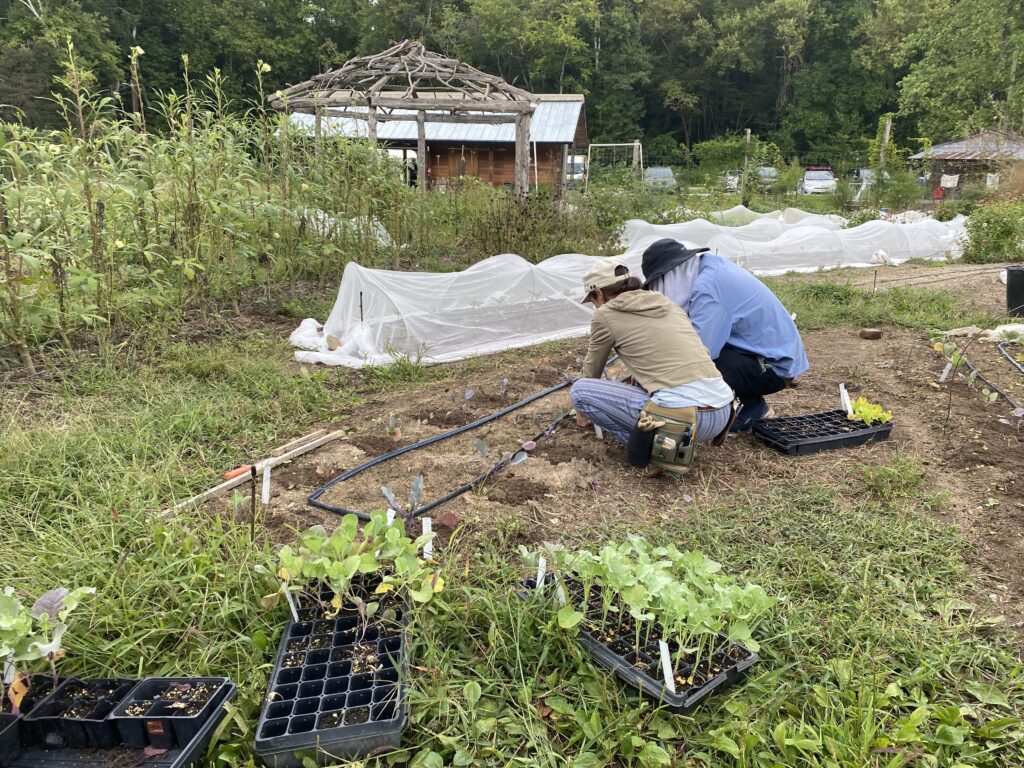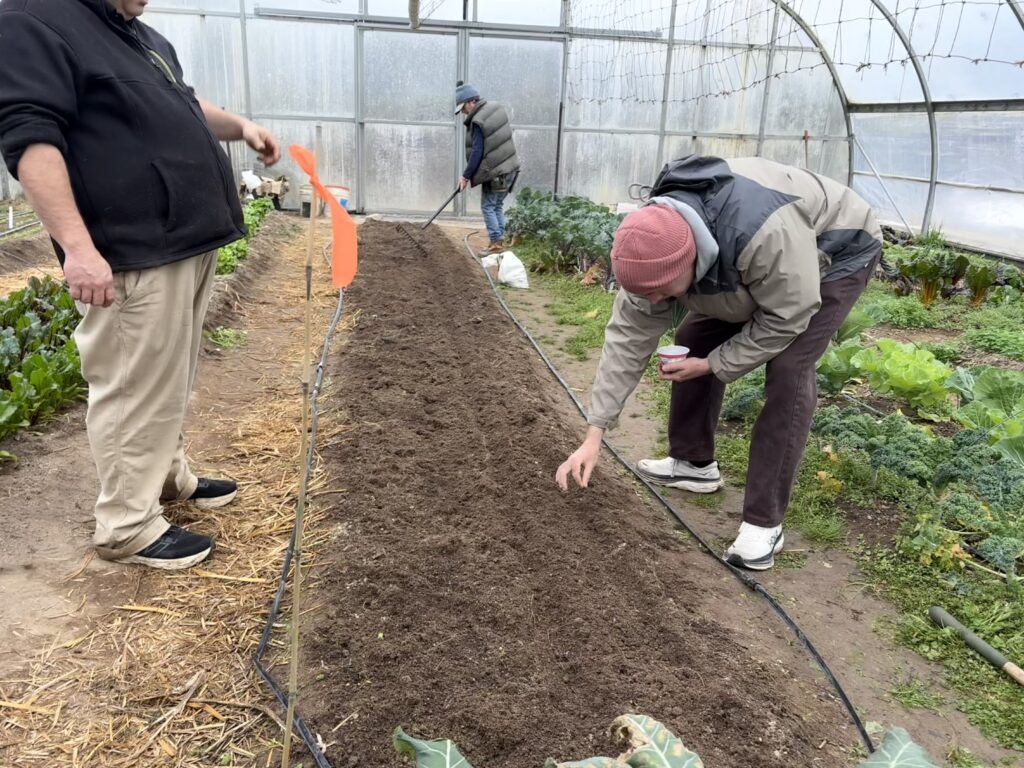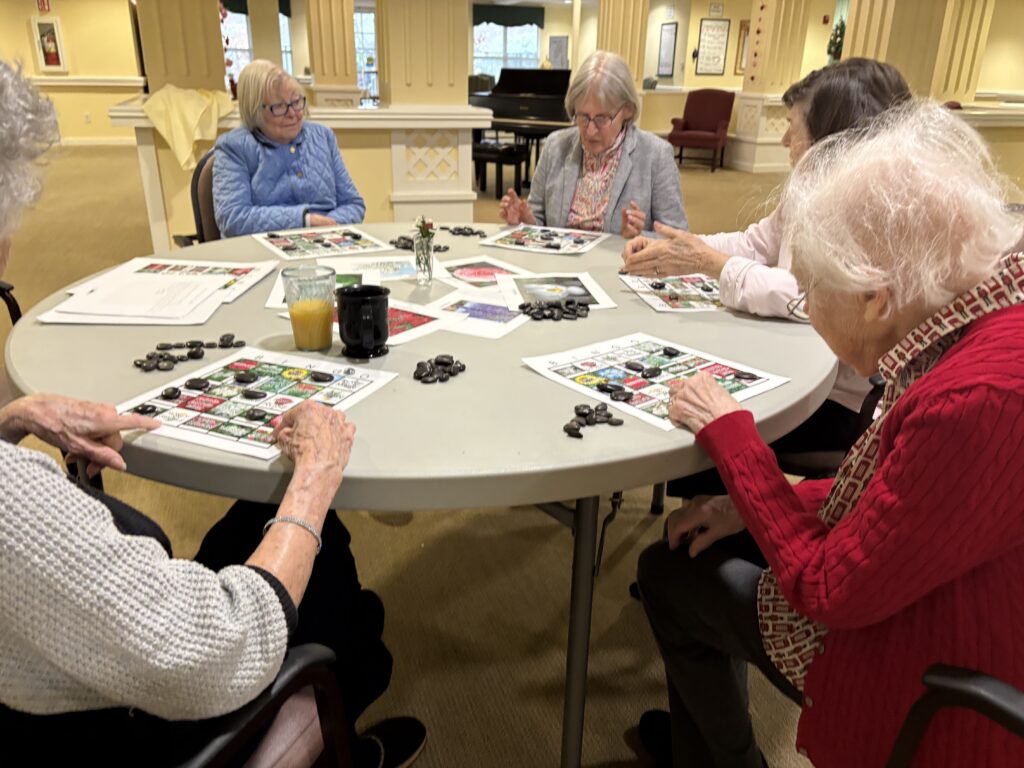Therapeutic Horticulture at NC Botanical Garden
go.ncsu.edu/readext?1060298
en Español / em Português
El inglés es el idioma de control de esta página. En la medida en que haya algún conflicto entre la traducción al inglés y la traducción, el inglés prevalece.
Al hacer clic en el enlace de traducción se activa un servicio de traducción gratuito para convertir la página al español. Al igual que con cualquier traducción por Internet, la conversión no es sensible al contexto y puede que no traduzca el texto en su significado original. NC State Extension no garantiza la exactitud del texto traducido. Por favor, tenga en cuenta que algunas aplicaciones y/o servicios pueden no funcionar como se espera cuando se traducen.
Português
Inglês é o idioma de controle desta página. Na medida que haja algum conflito entre o texto original em Inglês e a tradução, o Inglês prevalece.
Ao clicar no link de tradução, um serviço gratuito de tradução será ativado para converter a página para o Português. Como em qualquer tradução pela internet, a conversão não é sensivel ao contexto e pode não ocorrer a tradução para o significado orginal. O serviço de Extensão da Carolina do Norte (NC State Extension) não garante a exatidão do texto traduzido. Por favor, observe que algumas funções ou serviços podem não funcionar como esperado após a tradução.
English
English is the controlling language of this page. To the extent there is any conflict between the English text and the translation, English controls.
Clicking on the translation link activates a free translation service to convert the page to Spanish. As with any Internet translation, the conversion is not context-sensitive and may not translate the text to its original meaning. NC State Extension does not guarantee the accuracy of the translated text. Please note that some applications and/or services may not function as expected when translated.
Collapse ▲NC State Therapeutic Horticulture Program is thrilled to feature our closest partners, North Carolina Botanical Garden! Together, we have developed and co-instruct the four Online Therapeutic Horticulture courses, where we teach professionals, volunteers and students everything we know about delivering high-quality programs in the community. When we are not teaching, we both have robust outreach activities, and this month, we are spotlighting the work our amazing partners are doing in Central North Carolina. We spoke with Emilee Weaver, Program Manager and Sarah Tanke, Therapeutic Horticulture Community Engagement Specialist, to learn all about their work.
About the Program:
What are the primary goals of your therapeutic horticulture program?
Historically, the NCBG Therapeutic Horticulture program has been largely focused on providing direct TH services to clients in our immediate community. However, in more recent years, our program goals and mission have expanded to include intensive educational offerings through the development of Online and Hybrid TH Certificate programs, in collaboration with the NC State Extension Gardener program, that equip students with the skills, resources, and confidence to become TH practitioner themselves. Our primary goal with these educational programs is to increase access to TH education for a larger number of students from diverse backgrounds and locations. As such, we have gained a community of vibrant students from 45 different states and 19 countries.
We are very fortunate to serve a number of different populations with our local direct service work and the primary goals of these programs vary depending on who we are working with. Generally, we aim to improve mental, physical, and/or emotional well-being through connection with nature, promote accessibility and inclusion in gardening, and support healing and growth for individuals from diverse backgrounds.
What types of activities and experiences do you offer?
Activities can range from hands-on gardening, plant propagation, and vocational training in horticulture, to mindfulness exercises, nature-based art, and sensory garden experiences. Our programs are always tailored to meet the needs of the specific groups we are working with.
How long have you been offering this program?
The NC Botanical Garden has been proudly offering therapeutic horticulture services for 47 years and is considered a leader in the TH field. Our online and hybrid TH certificate programs and international partnerships (e.g., with Ukraine and Armenia) have been established more recently within the past three years. We have worked with some of our direct service clients, such as the Farm at Penny Lane, for over 10 years!
What kind of outcomes and benefits can participants expect from the program?
Participants across our many programs can receive benefits such as improved mental health, increased physical activity, reduced stress, greater social connection, and enhanced vocational skills. All our programs aim to also foster a deeper connection to nature and promote environmental stewardship.
How do you tailor the program to meet the individual needs of each participant?
Our programs emphasize flexibility and personalization. Participants’ goals, preferences, and strengths are assessed through discussions and consultations and are taken into consideration in the planning process for every activity. All our activities are designed to accommodate the varying physical, cognitive, and emotional needs of our participants. For example, raised garden beds are available for those with limited mobility, and tasks are broken into manageable steps for participants with cognitive challenges. We also use trauma-informed care principles to guide our interactions and programming.
Meeting the individual needs of our students is also of paramount importance to us. This is evidenced by an ongoing project where we have been translating our Online TH Certificate program into Ukrainian so that the country of Ukraine can utilize our educational resources and become proficient TH practitioners who will assist in the massive healing efforts that are occurring and will continue to occur for many years during and after Russia’s invasion of Ukraine. For our English-speaking students, we are developing extensive printable written resources to reduce the eye stressing screen time required for online students, while referring our international students to free apps and programs that will translate course materials for them into their own language or read resources aloud when reading is not an option.
How do you promote social interaction and community building among participants?
We actively design our therapeutic horticulture programs to foster a deep sense of connection and belonging among participants, knowing that community can be a vital part of the healing process. Social interaction is not an afterthought; it’s woven into the structure of the program and every activity we offer.
For example, we use group gardening projects to encourage collaboration—tasks like planting a communal garden bed or harvesting together naturally invite teamwork and shared accomplishment. These shared moments build trust and camaraderie organically.
Facilitated discussions are another key element. At the start or end of each session at the Farm at Penny Lane for example, we hold group check-ins where participants can share their experiences, reflect on their progress, or even just talk about how they’re feeling that day. These moments are designed to create space for listening and validation, which helps participants feel seen and heard.
We also view the group as a resource in itself. Many participants bring their own expertise, stories, and strengths to the table, and we create opportunities for them to share and mentor one another. Whether it’s exchanging advice, reflecting on their personal growth, or simply offering encouragement, these interactions strengthen the sense of belonging.
Overall, we strive to create a space where participants feel welcomed, valued, and connected to one another—and by extension, to the broader community around them.
About the Therapeutic Relationship
How do you build rapport and trust with participants?
Building rapport starts with meeting participants where they are. From the first interaction, we take the time to listen—really listen—to their stories, goals, and concerns. We approach everyone with genuine curiosity and respect, ensuring they feel valued as individuals. Trust also develops through consistency; we show up reliably, maintain clear communication, and follow through on promises. Activities are paced to allow participants to settle into the program at their own comfort level, with no pressure to perform or share until they’re ready.
How do you create a supportive and non-judgmental environment for participants?
We prioritize creating a space where participants feel safe—physically, emotionally, and socially. This starts with setting a tone of acceptance and respect, which we model as facilitators and encourage among the group. Activities are designed to be inclusive and adaptable, celebrating effort and growth rather than outcomes. We also establish group guidelines to ensure that interactions are positive and respectful, and we practice trauma-informed care to approach challenges with sensitivity. This combination of structure and flexibility allows participants to engage in ways that feel authentic to them. At NCBG, we believe that it is our job to accompany our direct service clients and students on their journeys and work shoulder to shoulder with them as they strive to reach the goals they have established for themselves.
For more information on NC Botanical Garden’s Therapeutic Horticulture programs, visit their website.





